Latest News
NSA level talks hold the key as India-Afghanistan get set to re-engage
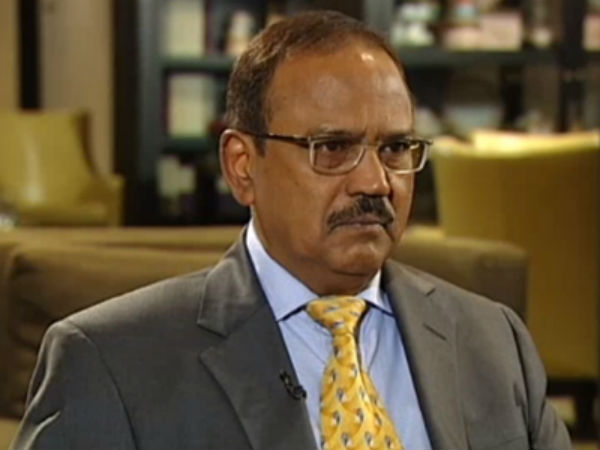
The visit by Afghanistan’s National Security Advisor, Hanif Atmar to New Delhi is important as it signals the re-engaging of talks with India.
Atmar will hold talks with India’s National Security Advisor, Ajit Doval on a host of issues and this exercise is expected to better the ties between the two nations.
The Ashraf Ghani regime in Afghanistan which showed signs of titling towards Pakistan now wants to re-engage with India.
The talks come at a time when Afghanistan is gradually shying away from Paksitan and experts would say that the Kunduz operation is one of the main reasons for this change in stance.
During the Kunduz operation dubbed as a major intelligence failure in Afghanistan, the Taliban had taken control.
Investigations went on to show that the Taliban had sought the help of the Lashkar-e-Tayiba fighters for this operation.
This has not gone down too well with Afghanistan as it is aware that no member of the Lashkar would budge even an inch without the approval of the Pakistan’s ISI.
Atmar realizes the importance of India:
Atmar has always had a leaning towards India. Although Ashraf Ghani initially tilted towards Pakistan, it was Atmar who ensured that the controversial pact between Afghanistan and Pakistan was aborted.
The pact was meant to pave the way for intelligence sharing between Afghanistan and Pakistan. The pact also stated that both nations will not blame each others intelligence services in the wake of a terror strike, a clause that had surprised India.
Atmar is also aware that Afghanistan is finding it hard to reign in the Taliban due to the support it has from Pakistan sponsored terror groups.
The very intent of Pakistan in helping Afghanistan grow has been in doubt and the same has been questioned several times by Atmar who also realizes that India is a better strategic partner. Both India and Afghanistan have a common enemy in the Taliban and Lashkar.
Although Pakistan has tried to impress on the world that it is the only nation which can help Afghanistan restore peace and stability, this has been doubted.
There are not many takers for the Pakistan point of view within Afghanistan. The popular view is why does Pakistan continue to send Lashkar fighters to aide the Taliban when it claims it wants peace in Pakistan.
Taking all these aspects into consideration the Doval-Atmar meeting becomes extremely important.
OneIndia news

Latest News
IEA’s top security officials meet supreme leader
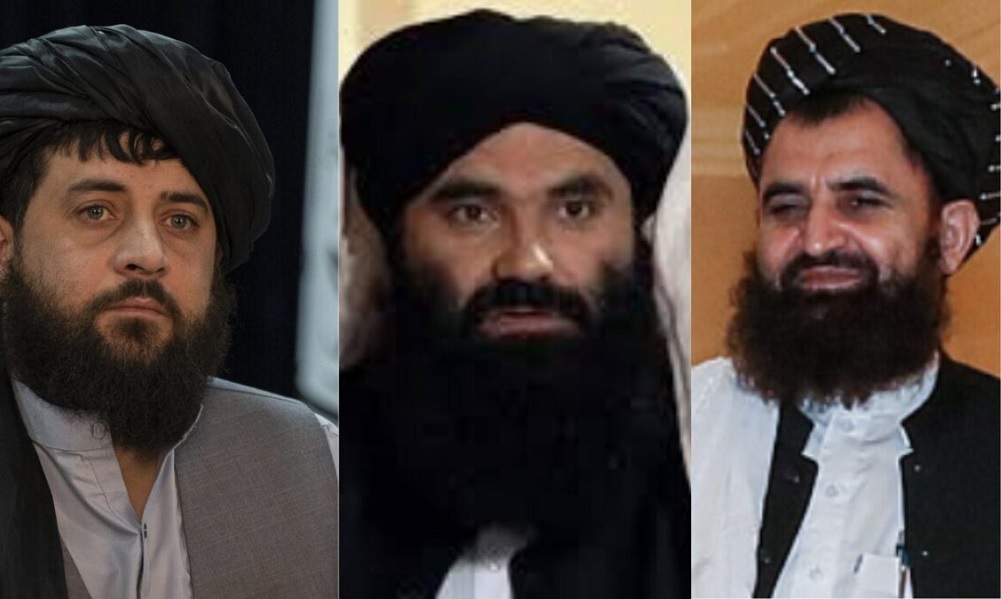
Senior security officials including Acting Interior Minister Sirajuddin Haqqani and Acting Defense Minister Mohammad Yaqub Mujahid met with Mawlawi Hibatullah Akhundzada, the supreme leader of the Islamic Emirate of Afghanistan, IEA’s spokesman Zabihullah Mujahid announced on Friday.
Mujahid said on X that the meeting, which took place in Kandahar province, presented the country’s security report.
He added that the proposals of the security institutions were listened to and they were given necessary instructions.
According to him, necessary decisions were taken to improve the order, equipping and capacity building of security institutions.
The meeting was also attended by Director of Intelligence Abdul Haq Wasiq, Deputy Defense Minister Abdul Qayum Zakir and Deputy Interior Minister Mohammad Nabi Omari.
Latest News
Afghanistan-Iran-Europe railway corridor activated

The Iranian Embassy in Kabul announced on Thursday that the Afghanistan-Iran-Europe railway corridor has become operational.
In a statement, the embassy said the first export shipment from Afghanistan has started its journey through the Afghanistan-Iran railway corridor to Turkey and Europe.
The corridor was activated with the presence of the Iranian Consul General in Herat and the governor of the province, the statement read.
The statement added that the activation of this corridor, with Iran’s cooperation, will contribute to the improvement of Afghanistan’s economy.
Latest News
Amnesty international urges Pakistan to halt Afghan deportations
Amnesty International said that all Afghan nationals are required to leave the cities of Islamabad and Rawalpindi by 31 March

Amnesty International on Wednesday called on Pakistan to immediately withdraw its “Illegal Foreigners Repatriation Plan”, which primarily targets Afghan refugees, ahead of the authorities’ 31 March deadline.
Pakistani government has asked all “illegal foreigners” and Afghan Citizen Card holders to leave the country before March 31, warning they would otherwise be deported from April 1.
Amnesty International said that all Afghan nationals are required to leave the cities of Islamabad and Rawalpindi by 31 March
It said that “arbitrarily and forcibly expelling Afghan nationals, including refugees and asylum seekers, will only add to their plight”.
“The Pakistani government’s unyielding and cruel deadline, which is less than a week away, to remove Afghan refugees and asylum seekers from two major cities, resulting in the deportation of many at risk, shows little respect for international human rights law, particularly the principle of non-refoulement,” said Isabelle Lassée, deputy regional director for South Asia at Amnesty International.
The exact details of the Pakistan government’s ‘Illegal Foreigners Repatriation Plan’ used for deportations has never been made public, but it comes amid a campaign to wrongfully demonize Afghan nationals as so-called criminals and terrorists, Amnesty said.
Isabelle Lassée said that the Pakistani government is only making “a scapegoat of a community that has long been disenfranchised and fleeing persecution.”
Human rights lawyer Moniza Kakar pointed out that forcing Afghan refugees to relocate even within Pakistan is devastating for families. “Many PoR card holders are people who’ve been here for decades, asking them to relocate means you’re asking them to leave homes, businesses, communities and lives they’ve built for years,” she said.
Lawyer Umer Gillani, who has challenged the deportation orders in Pakistan’s Supreme Court and Islamabad High Court, argued that the March 31 deadline was not legally enforceable. “The official notification has not been issued under any particular law; it is just an executive instruction,” he stated.
Meanwhile, the International Organization for Migration (IOM) reported a sharp decline in Afghan returns and deportations during the first half of March. Between March 1 and 15, returns dropped by 67 per cent, while deportations fell by 50 per cent compared to the previous reporting period (February 16-28).
-

 International Sports5 days ago
International Sports5 days agoRCB bring fireworks to opening night of IPL 2025
-
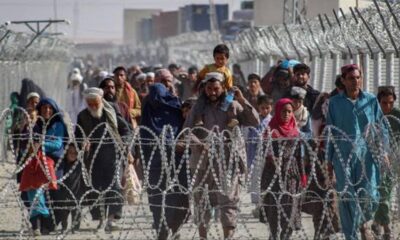
 Latest News5 days ago
Latest News5 days agoTorkham border reopens for pedestrians
-
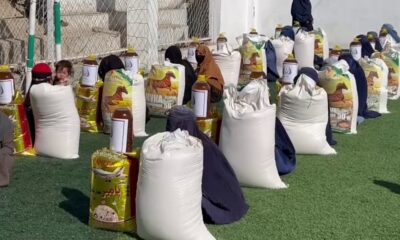
 Latest News5 days ago
Latest News5 days agoBayat Foundation distributes food aid to dozens of needy families in Balkh
-

 International Sports4 days ago
International Sports4 days agoIPL 2025: Sunrisers on a batting rampage; triumph over Rajasthan Royals
-

 Latest News4 days ago
Latest News4 days agoEU says girls’ education crucial for Afghanistan’s long-term prosperity
-

 Business5 days ago
Business5 days agoDeputy PM inaugurates launch of Arghandi Transport Terminal Project in Kabul Province
-

 Sport4 days ago
Sport4 days agoACB names Afghanistan A squad for tri-nation series
-
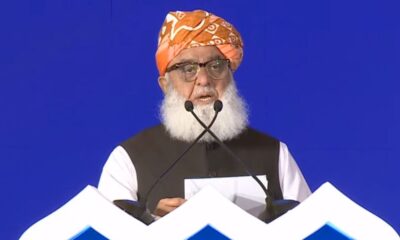
 Latest News5 days ago
Latest News5 days agoPakistan’s mistakes played significant role in rise of terrorism: Maulana Fazl-ur-Rehman















